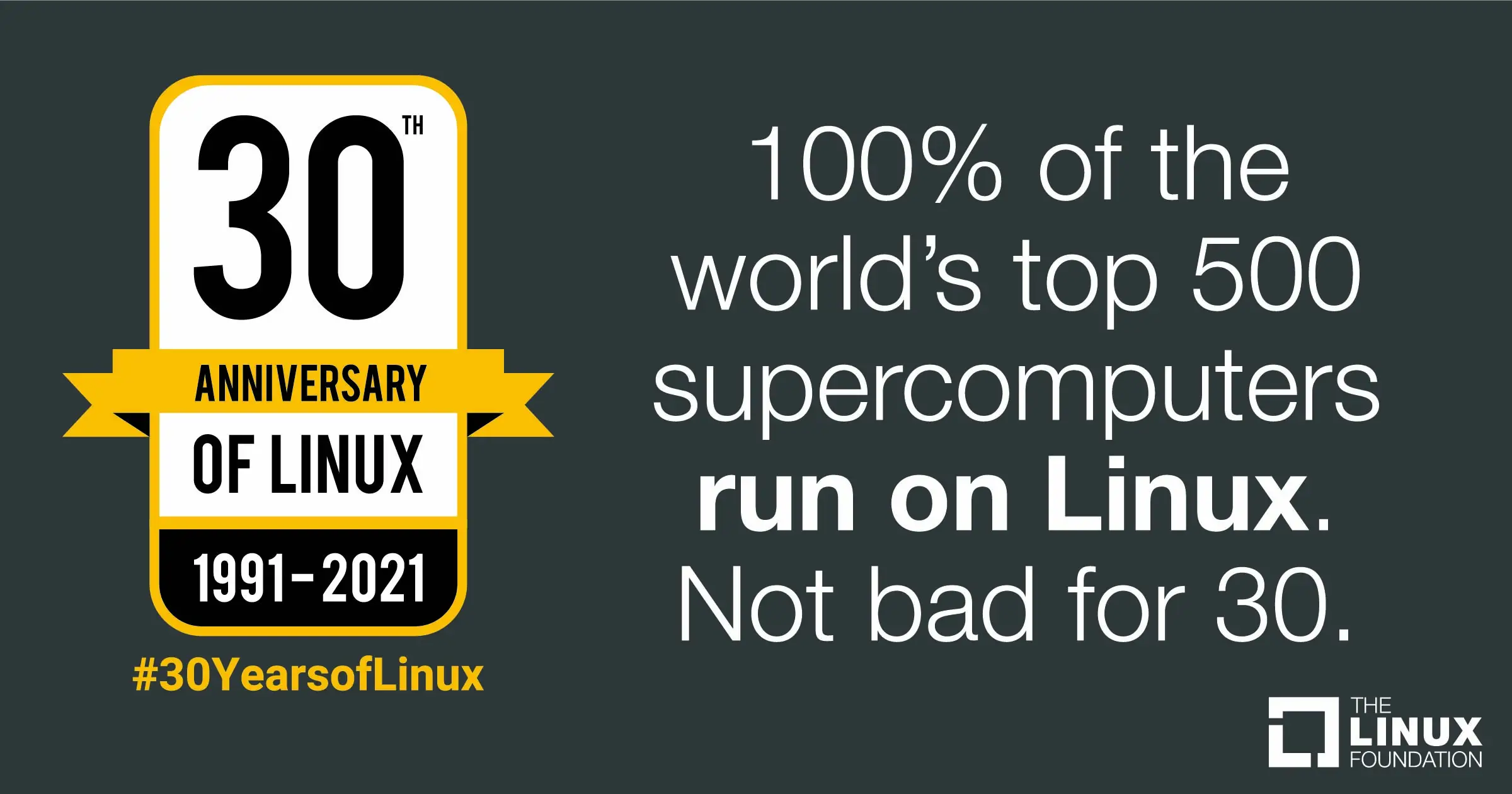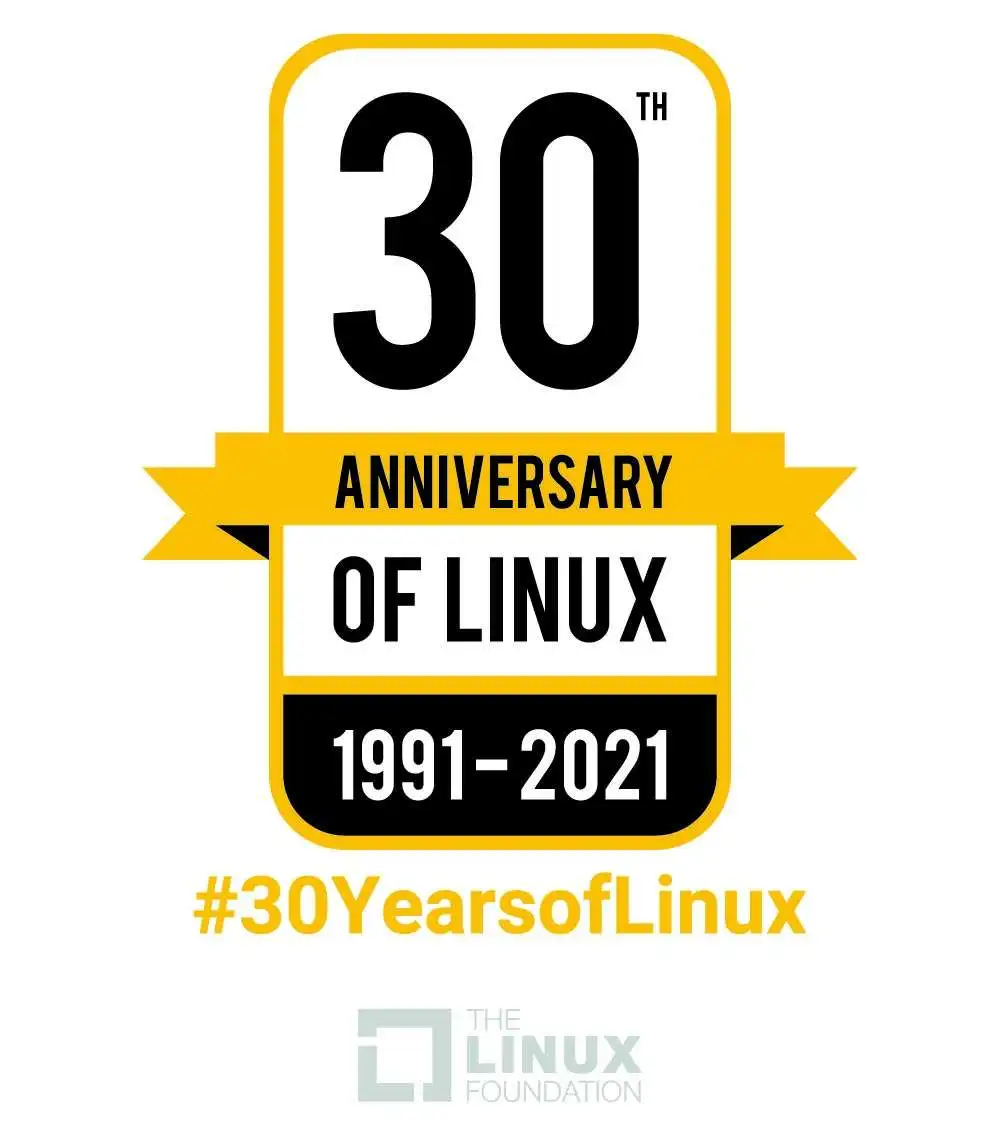Linux is launched and its origins are a small personal project
On 25 August 2021, the 30th birthday of Linux, 30 years ago, Linus Torvalds (hereinafter Linus), a 21-year-old student at university in Helsinki, made a post on Minix Useneg, announcing for the first time that he had made a free operating system called Linux.
“I’m making a free operating system, just a hobby, not as big and professional as GNU”. Little did Linus know at the time that a small project driven by his hobby would develop into a world-changing operating system kernel.
And because the post was published on 25 August, many Linux enthusiasts see it as the true birth date of Linux, not 17 September when the first Linux kernel 0.01 was released, or 5 October when the first official version 0.02 was released.

The world’s most popular operating system kernel
For 30 years, Linus Torvalds has led the development and design of the Linux kernel, which has grown from a hobby-driven personal project to a world-changing computer operating system kernel. Today the top 500 supercomputers in the world run Linux, as do over 70% of smartphones, Microsoft uses Linux more than even Microsoft Windows on its Azure cloud, and Linux is found in embedded electronics, the Internet of Things space and more.
Linux started out as a small hobby project for Linus, but by late 1991 and early 1992, as the number of customers grew and more people were pushing out patches to help improve Linux, Linux had become much bigger than expected and Linus realised that Linux was not just a hobby, but that there were people who liked it and were using it. Linux, and that Linux can do much more than expected. His perception of the project changed from a “personal project” to a “multi-user, bug-feeding, patch-fixing, etc.”.
With the change of licence to the GPLv2, IBM’s capital injection, the Oracle DB port, Red Hat’s public offering, the introduction of Git and the establishment of the Linux Foundation, the Linux kernel has developed in an orderly and healthy way.
The Linux kernel is now used in a wide range of applications.
The voice behind the success of Linux
On the occasion of Linus Torvalds’ release celebrating the 30th anniversary of Linux, Red Hat said “Linux has been the most successful operating system ever because its license allows for copying, improving, distributing, and requiring the sharing of changes (the license does not require collaboration, but the reciprocal nature of Linux strongly encourages it)”.
Kees Cook, a security and Linux kernel engineer at Google, said that “the importance of Linux to today’s Internet ecosystem cannot be overstated”, that “Linux is now running on everything from our everyday smartphones to the International Space Station” and that “dependence on the Internet is dependence on Linux”.
“The “original” goal of having a working kernel for all hardware for all people is still the current goal of Linux”, says GK-H, who has been working on Linux for over 20 years, “We all just want to make a kernel that works for us and others, and we’ve had a lot of challenges over the years, including changes to the development model, how the process works, the time-based release model, keeping each release stable, etc.”.
Referring to how he sees competitors such as Fuchsia, GK-H said “I hope there will be some real competition in terms of operating system kernels, some of the ideas in Fuchsia are interesting and I have discussed them with the developers there, and if there are any good ideas coming out of other projects, that would make sense for Linux as well”.
The Linux Foundation emphasises that we have always had an overall goal of having a high quality operating system and will build new processes and dedicated tools as needed to help improve productivity and further enhance the stability and reliability of the Linux kernel. At this stage Linux already has a very good foundation and it should continue to lead the way in creating best practices for the development of the open source Internet industry as a whole.

A look back at 30 major Linux milestones
Let’s take a look back at 30 milestones in Linux over the last 30 years and see how Linux went from a small project to the huge operating system kernel it is today.
- 25 August 1991 Linus Torvalds announces the birth of Linux to the world.
- 17 September 1991 Linus releases the first version of Linux, V0.0.1.
- 1992 The first Linux battle, “LINUX is obsolete”.
- 1993 Slackware Linux is released and in the same year the Debian Linux project is launched, becoming the basis for popular Linux distributions such as Mint and Ubuntu.
- 1994 Linus releases Linux 1.0 for the first time under the GNU General Public License (GPL).
- 1994 Red Hat (Red Hat) Linux Corporation is born.
- 1995 Linux holds its first commercial conference Linux Expo.
- 1996 KDE, the first mainstream desktop operating system for Linux, is launched, and in the same year SUSE releases its first standalone Linux distribution.
- 1997 The GNOME Desktop project is launched, and today it is an important desktop system for Linux, along with KDE.
- 1998 Raymond, an early open source leader of Linux, reveals a “Halloween memo” which shows that Microsoft sees Linux as a major threat and begins to develop an anti-open source strategy and campaign against Linux.
- 1999 Corel announces the first mainstream Linux desktop, which is not successful but shows the way for the successor Ubuntu.
- 1999 Linux and Windows NT compete for the first time in file servers, and Linux wins.
- 2000 IBM invests $1 billion in Linux, which proves to be the smartest investment IBM has ever made.
- 2000 The Linux Foundation is established to build a sustainable ecosystem around open source projects and to promote the healthy development of Linux.
- 2001 Linux 2.4 is released, by which time Linux has become comparable to other high-end server operating systems (such as Solaris).
- 2003 SCO began suing IBM and other companies, accusing Linux of copying Unix, and although it ended in SCO’s bankruptcy, the lawsuit plagued Linux’s commercial development for many years.
- In 2004, Ubuntu, based on Debian Linux, was released and quickly became the super popular Linux desktop operating system.
- 2004 Linux dominates supercomputers, with more than half of the world’s fastest supercomputers running Linux.
- 2005 Linus Torvalds headlines on the cover of Business Week.
- 2005 Linus writes a distributed version control system Git. Within a month, the source code of Linux systems is already managed by Git. Git also quickly became the most popular distributed version control system.
- 2007 Google joins forces with hardware manufacturers to form the Open Handset Alliance to release Android, which is now the most popular operating system for mobile.
- 2008 The stock exchange switches to Linux as its core operating system.
- 2011 Google launches the first Chromebook, the CR-48, running ChromeOS based on Gentoo-Linux.
- 2012 The IT industry starts to move from servers and data centres to the cloud, with cloud devices running on Linux.
- 2012 Red Hat (Red Hat) becomes the first $1 billion open source company.
- 2014 Microsoft’s current CEO, Satya Nadella, demonstrates a preference for Linux, and Microsoft then moves towards embracing open source by deploying Linux and open source software in the cloud and on-premise.
- 2018 Microsoft continues its support of open source by opening its entire patent portfolio to members of the Open Invention Network (OIN) open source patent consortium. OIN is the non-profit organization that defends all patents for Linux.
- 2019 Microsoft launches its own native Linux for Windows 10 users - Windows Subsystem for Linux 2.0.
- 2019 IBM acquires Red Hat (Red Hat) for $34 billion, the largest software acquisition ever. Further establishing Linux’s dominance.
- 2020 The global cloud market spends over $100 billion per year, with 90% of cloud devices running on Linux.
Finally, in 30 years Linux has changed the world and become an integral part of it, thanks to Linus Torvalds and to all those who have contributed to Linux.
Reference links.
https://zh.wikipedia.org/wiki/Linux%E5%8E%86%E5%8F%B2
https://www.theregister.com/2021/08/25/30_years_of_linux_red_hat/?td=keepreading-top